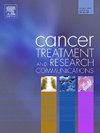New therapeutic approaches for EGFR mutated non-small cell lung cancer on osimertinib era
IF 2.4
Q3 Medicine
引用次数: 0
Abstract
Introduction
EGFR-mutated non-small cell lung cancer (EGFRmut NSCLC) represents a heterogeneous group of tumors with varying clinical outcomes. Resistance to osimertinib, a third-generation EGFR tyrosine kinase inhibitor (EGFR-TKI), is inevitable, with emerging evidence suggesting that concurrent genomic alterations influence treatment efficacy.
Materials and Methods
This retrospective study analyzed 58 stage IV EGFRmut NSCLC patients treated with osimertinib across four hospitals in Madrid, Spain, between March 2021 and February 2023. Comprehensive genomic profiling was conducted using next-generation sequencing (NGS) to evaluate co-mutations. Kaplan-Meier survival curves and Cox regression were applied to assess progression-free survival (PFS) and overall survival (OS).
Results
A second co-mutation was identified in 44.1 % of patients, with TP53 (70 %) being the most frequent, followed by EGFR (11.5 %), PI3K (11.5 %), and MET amplifications (7.7 %). Patients with co-mutations exhibited significantly worse PFS compared to those with only EGFR mutations (HR: 8.0, 95 % CI: 1.81–35.4; p = 0.001). Specifically, TP53 co-mutations were associated with reduced PFS (HR: 21.6, 95 % CI: 2.77–169; p < 0.001) and a non-statistically significant trend toward worse OS (HR: 3.10, 95 % CI: 0.89–10.8; p = 0.062).
Discussion
This study highlights the prognostic impact of co-mutations, particularly TP53, in EGFRmut NSCLC treated with osimertinib. These findings underscore the need for novel therapeutic approaches and personalized treatment strategies, especially in subgroups with poor prognoses. Trials such as MARIPOSA and FLAURA-2 provide promising evidence for treatment intensification, but careful patient stratification is essential to balance efficacy and toxicity.
奥西替尼时代EGFR突变非小细胞肺癌的新治疗方法
egfr突变的非小细胞肺癌(EGFRmut NSCLC)代表了一组具有不同临床结果的异质性肿瘤。奥西替尼是第三代EGFR酪氨酸激酶抑制剂(EGFR- tki),耐药是不可避免的,新出现的证据表明,同时发生的基因组改变会影响治疗效果。材料和方法本回顾性研究分析了2021年3月至2023年2月期间西班牙马德里四家医院接受奥西替尼治疗的58例IV期EGFRmut NSCLC患者。利用下一代测序(NGS)进行了全面的基因组分析,以评估共突变。Kaplan-Meier生存曲线和Cox回归评估无进展生存期(PFS)和总生存期(OS)。结果44.1%的患者存在第二共突变,其中以TP53(70%)最为常见,其次是EGFR(11.5%)、PI3K(11.5%)和MET扩增(7.7%)。与仅有EGFR突变的患者相比,共突变患者的PFS明显更差(HR: 8.0, 95% CI: 1.81-35.4;P = 0.001)。具体来说,TP53共突变与PFS降低相关(HR: 21.6, 95% CI: 2.77-169;p & lt;0.001),且OS恶化趋势无统计学意义(HR: 3.10, 95% CI: 0.89-10.8;P = 0.062)。本研究强调了共突变(尤其是TP53)对奥西替尼治疗EGFRmut NSCLC预后的影响。这些发现强调需要新的治疗方法和个性化的治疗策略,特别是在预后不良的亚组中。MARIPOSA和FLAURA-2等试验为强化治疗提供了有希望的证据,但仔细的患者分层对于平衡疗效和毒性至关重要。
本文章由计算机程序翻译,如有差异,请以英文原文为准。
求助全文
约1分钟内获得全文
求助全文
来源期刊

Cancer treatment and research communications
Medicine-Oncology
CiteScore
4.30
自引率
0.00%
发文量
148
审稿时长
56 days
期刊介绍:
Cancer Treatment and Research Communications is an international peer-reviewed publication dedicated to providing comprehensive basic, translational, and clinical oncology research. The journal is devoted to articles on detection, diagnosis, prevention, policy, and treatment of cancer and provides a global forum for the nurturing and development of future generations of oncology scientists. Cancer Treatment and Research Communications publishes comprehensive reviews and original studies describing various aspects of basic through clinical research of all tumor types. The journal also accepts clinical studies in oncology, with an emphasis on prospective early phase clinical trials. Specific areas of interest include basic, translational, and clinical research and mechanistic approaches; cancer biology; molecular carcinogenesis; genetics and genomics; stem cell and developmental biology; immunology; molecular and cellular oncology; systems biology; drug sensitivity and resistance; gene and antisense therapy; pathology, markers, and prognostic indicators; chemoprevention strategies; multimodality therapy; cancer policy; and integration of various approaches. Our mission is to be the premier source of relevant information through promoting excellence in research and facilitating the timely translation of that science to health care and clinical practice.
 求助内容:
求助内容: 应助结果提醒方式:
应助结果提醒方式:


